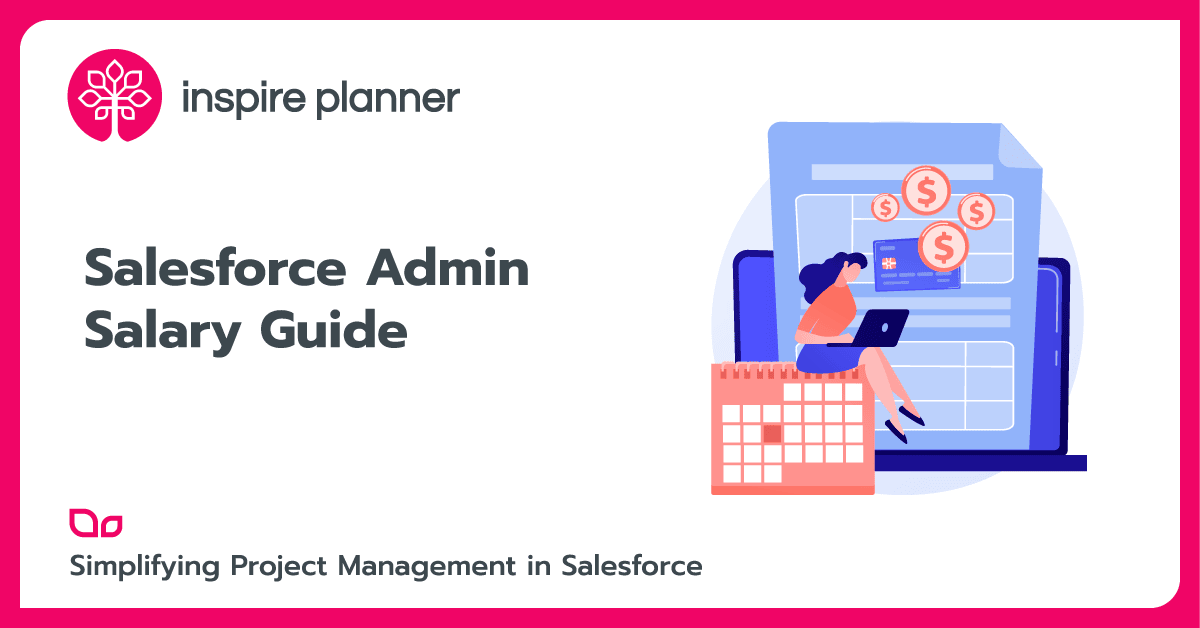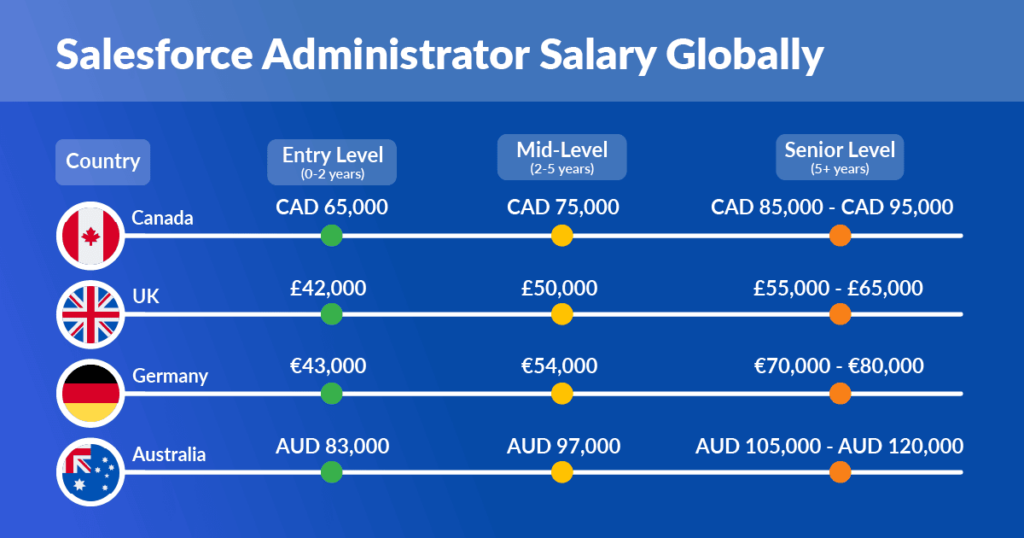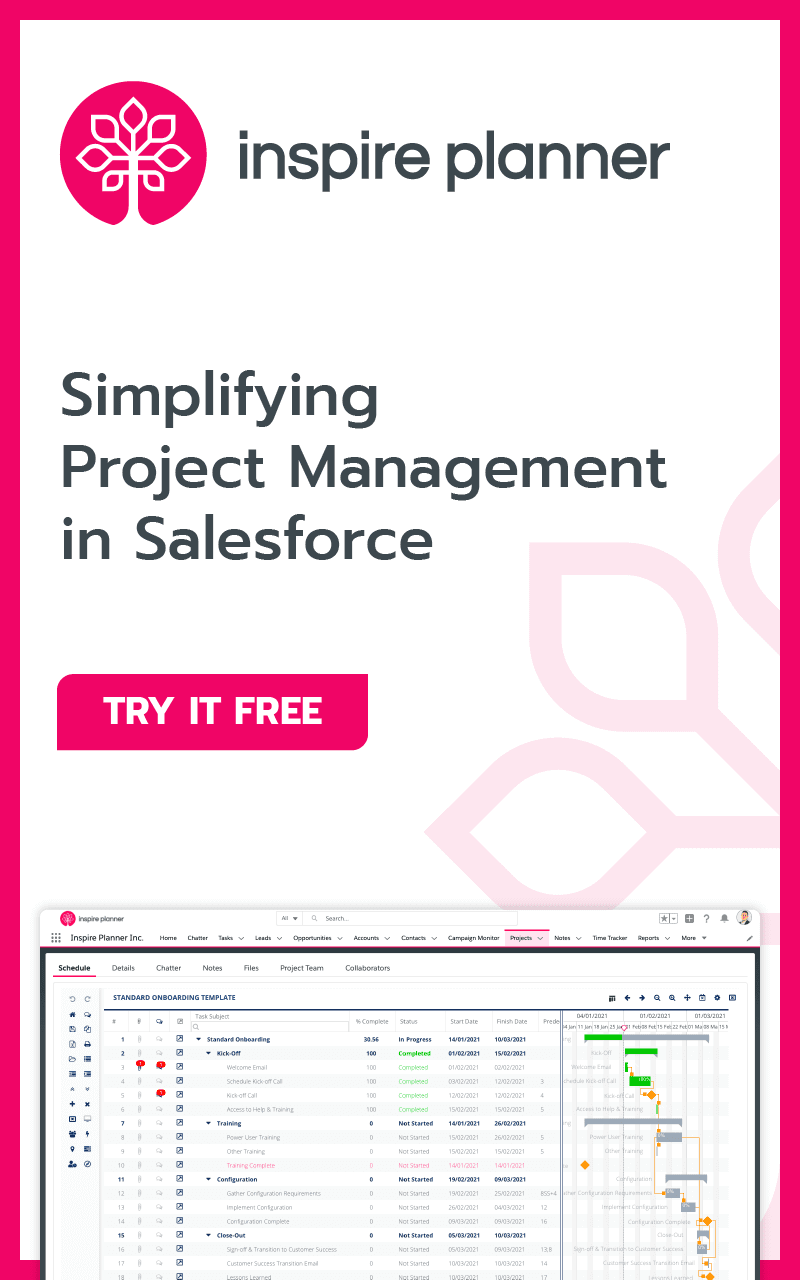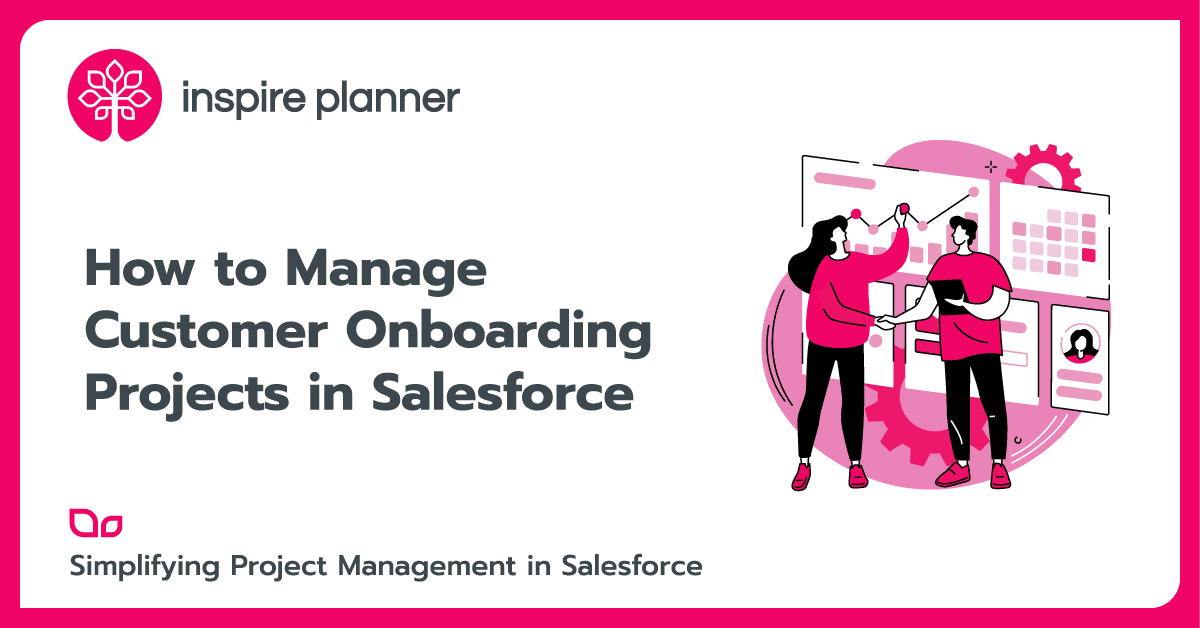Salesforce Admin Salary Guide (+ Tips to Earn More)
Salesforce
A startling statistic by Skuid reveals that 20 – 70% of CRM projects fail due to a lack of professional expertise. Businesses without skilled Salesforce Administrators are akin to the owners of expensive high-performance cars but without a driving license. You have it, but you can’t use it to its full potential. Like a skilled driver behind the wheel, Salesforce Administrators ensure the seamless operation of Salesforce, the world’s leading CRM platform. They can tailor the platform to suit unique business needs, navigating its complexities with ease. But an important question arises – which factors significantly influence a Salesforce Admin salary?
In this Salesforce Admin Salary Guide, we’ll take a deep dive into these questions, uncovering crucial insights along the way. From this guide, you can expect to uncover:
- The pivotal role of a Salesforce Administrator in the tech industry
- A comprehensive analysis of Salesforce Administrators’ salaries, taking into account factors such as experience, location, industry, and certifications
- The impact of certifications and experience on a Salesforce Admin salary
- Geographical variations for Salesforce Admin salaries in the USA, India, and globally
- Effect of job hopping vs. job tenure on the Salesforce Administrator salary progression
- Actionable tips for Salesforce Admins looking to boost their income
Let’s dive in and unravel the important aspects of being a successful Salesforce Administrator.
What does a Salesforce Admin do?
Salesforce Administrators wear many hats. They manage users, data, and security, customize Salesforce to suit business needs, build reports and dashboards, and provide training to end-users. Their role requires a blend of technical and soft skills, including problem-solving, communication, project management, and a deep understanding of Salesforce functionalities.
As per a study conducted by IDC, the Salesforce ecosystem, inclusive of its customers and partners, is projected to spawn 9.3 million new jobs and contribute to $1.6 trillion in fresh business revenues globally by 2026. As more companies adopt Salesforce, the role of Salesforce Administrators will only become more pivotal, rendering this profession not just a job, but a thriving career choice.
Salesforce Admin Salary in the USA
Entry-Level Salary & Average Salesforce Admin Annual Salary
According to Payscale, for those just starting their journey as Salesforce Administrators, the entry-level salary in the USA is approximately $61,000 per year. This figure represents the standard starting salary for administrators who have less than one year of experience. The figure can change based on variables like location, industry, and company size.
The average yearly salary for Salesforce Administrators in the USA is around $73,500. This figure is an average across various experience levels, industries, and locations within the USA. It includes the base salary, bonuses, profit sharing, and any other financial benefits, if applicable.
Variations of Salesforce Admin Salary Based on Experience and Industry
With 2-5 years of experience, administrators can expect to earn around $71,000 per year. Senior Salesforce Administrators with over 5 years of experience can earn upwards of $86,000 to $92,000 per year, as per Payscale data.
The industry also plays a key factor in determining salary. For instance, Salesforce Administrators in the tech and finance sectors often earn more than those in other industries due to the higher demand and complexity of tasks in these sectors.
Geographical Variations in Salesforce Admin Salary
Geographical location is another key factor influencing salaries. States that have higher living costs, such as California and New York, frequently offer increased salaries as a counterbalance. Similarly, states with a high concentration of tech companies, such as Washington and Texas, also tend to offer higher salaries due to the competitive job market.
Salesforce Admin Salary in India
India is one of the biggest markets for tech talent and it plays a crucial role in the Salesforce ecosystem. The income for Salesforce Administrators in India is also shaped by numerous variables such as experience, geographical location, industry, and certifications.
According to Talent.com, the structure of Salesforce Admin salary in India varies widely, depending on several factors. On average, they can expect to earn ₹1,100,000 per year. For those just beginning their Salesforce journey, the entry-level salaries are around ₹500,000 per year.
However, as Salesforce Administrators accumulate experience and hone their skills, their earning potential grows significantly. The most seasoned professionals in this field can command salaries of up to ₹1,737,500 per year, demonstrating the substantial financial progression possible in this career path.
Salesforce Administrator Salary Globally
In the ever-evolving technology landscape, Salesforce Administrators play a critical role globally. Here’s a summary of average Salesforce Administrator salaries in several countries across different experience levels:

These numbers can vary based on numerous factors, including the country, industry, and the size of the organization. As administrators gain more experience and become proficient in Salesforce functionalities, their salaries increase significantly.
Influence of Certification and Experience on Salary
The power of Salesforce certifications and experience in shaping a Salesforce Administrator’s salary cannot be understated. According to Mason Frank Salary Survey, it was revealed that 43% of respondents saw an increase in their salary after earning a certification, highlighting the direct correlation between professional upskilling and financial rewards.
It’s also essential to strategically focus on the most pertinent certifications. The Advanced Administrator certification, for instance, is highly sought-after as it validates expertise in advanced features and functionalities of Salesforce. Similarly, having a Platform App Builder certification can provide a considerable advantage for those who aspire to validate their proficiency in designing, creating, and deploying custom applications on the Salesforce platform.
Experience also holds immense weight on a Salesforce Admin salary. The same study by Mason Frank suggests that a Salesforce professional with over five years of experience can earn up to 20% more than their counterparts with lesser experience.
However, while it’s beneficial to have multiple certifications, it’s crucial to balance this with acquiring real-world experience. Employers value practical, hands-on experience, so focusing solely on certifications without applying the learned skills could potentially make you seem overqualified or out of touch with the practical aspects of the role.
Job Tenure Vs. Job-Hopping: What Affects Salary Progression More?
In the technology sector, and specifically within Salesforce roles, we often see a mixed bag of experiences. For some, loyalty to a single organization leads to steady salary progression, particularly if they can gain promotion within the organization. However, others find that changing jobs every few years accelerates their Salesforce Admin salary growth due to the “job-hopping premium.”
Based on the ADP Research Institute’s findings, employees who stick to their jobs have seen their wages grow by 5.9%, while those who switch jobs see a bigger leap, with an 8.0% increase.
However, it’s not all about chasing the highest salary. Job-hopping can potentially lead to perceptions of instability or a lack of commitment, which could impact future job prospects. On the other hand, staying with one company for an extended period might limit exposure to diverse experiences and potentially slow down the pace of skill development and career progression.
So, while job-hopping might bring immediate financial gain, consider other factors such as learning opportunities, work culture, work-life balance, and long-term career growth when making such decisions. After all, a fulfilling career is about more than just the numbers on your paycheck.
Tips to Increase Salesforce Admin Salary
Here are some actionable tips for Salesforce Administrators looking to boost their income.
- Obtain Salesforce Certifications: Salesforce offers an array of certifications that certify your understanding and expertise across various facets of the platform. Certifications like the Advanced Administrator or Platform App Builder are not just tokens of your dedication to mastering the platform; they also attest to your ability to handle more complex tasks. Earning these certifications can considerably enhance your market value.
- Specialize in a Particular Area: Although versatility is a desirable trait in Salesforce administrators, honing a specific area can elevate your value to businesses. For instance, focusing on CPQ (Configure, Price, Quote) can open up opportunities in sectors where pricing products or services is complex. By becoming an expert in CPQ, you position yourself as a specialist who can optimize complex processes, thereby increasing your earning potential. Check out our guide for the best resources for Salesforce Training.
- Focus on Self-Improvement: There are multiple resources online that can help you improve in different areas that could help you boost your income. For example, you can start with a free Salesforce Career Accelerator Toolkit by Talent Stacker. This toolkit offers videos, guides and downloadable templates for developing a Brand Strategy, your Career Plan, Negotiation Templates, Overcoming Imposter Syndrome, Utilizing AI in your career, and much more!
- Add Value to the Business: Salesforce Administrators can increase their salary by demonstrating their value to the business. This could involve automating processes in Salesforce, implementing new features that increase efficiency, or training end-users to better utilize the platform. By showing how your work contributes to the business’s bottom line, you can make a strong case for a higher salary. Here you can find more tips on how to be a successful Salesforce Administrator.
- Understand Your Worth: Use resources like the annual Mason Frank Salary Survey, Payscale, or Glassdoor to get a realistic picture of what a typical Salesforce Admin salary is based on your location, industry, and level of experience. This helps you gauge your market value and provides a base to start negotiations.
- Be Prepared: Before the negotiation, list down your key contributions and achievements. Include specific projects or initiatives that had a substantial impact on the business. This can provide compelling evidence of your worth.
- Practice Active Listening: Negotiation isn’t just about making demands; it’s about understanding the other party’s perspective as well. Listening can help you identify what’s important to the employer and find common ground.
- Seek a Mentor: Search for professionals who are a couple of stages ahead of you in their Salesforce career, preferably 2-5 years. These individuals will have recent, relevant experience that aligns closely with the challenges you’re likely to encounter.
Summary
As the digital transformation wave continues to surge, the demand for skilled Salesforce Administrators is skyrocketing. Notably, these professionals’ roles extend beyond technical proficiency, demanding a harmonious blend of soft skills and a deep understanding of business processes.
The influence of certifications, experience, and geographical location on a Salesforce Admin salary can’t be overstated. A certified Salesforce Administrator, especially with niche skills like CPQ, can expect a salary boost, with further increments paralleling their accumulating experience. The data shows that frequent job switches might also contribute to a faster income rise compared to longer tenures at one company.
Nevertheless, it’s not just about chasing certifications or switching jobs. Building a robust network, seeking mentors, and honing your negotiation skills are integral to enhancing your value and, consequently, your earning potential.
For the prospective Salesforce Admins or seasoned ones seeking advancement, remember that it’s a combination of continuous learning, strategic career moves, and leveraging the vibrant Salesforce community that will place you in the top salary brackets.



